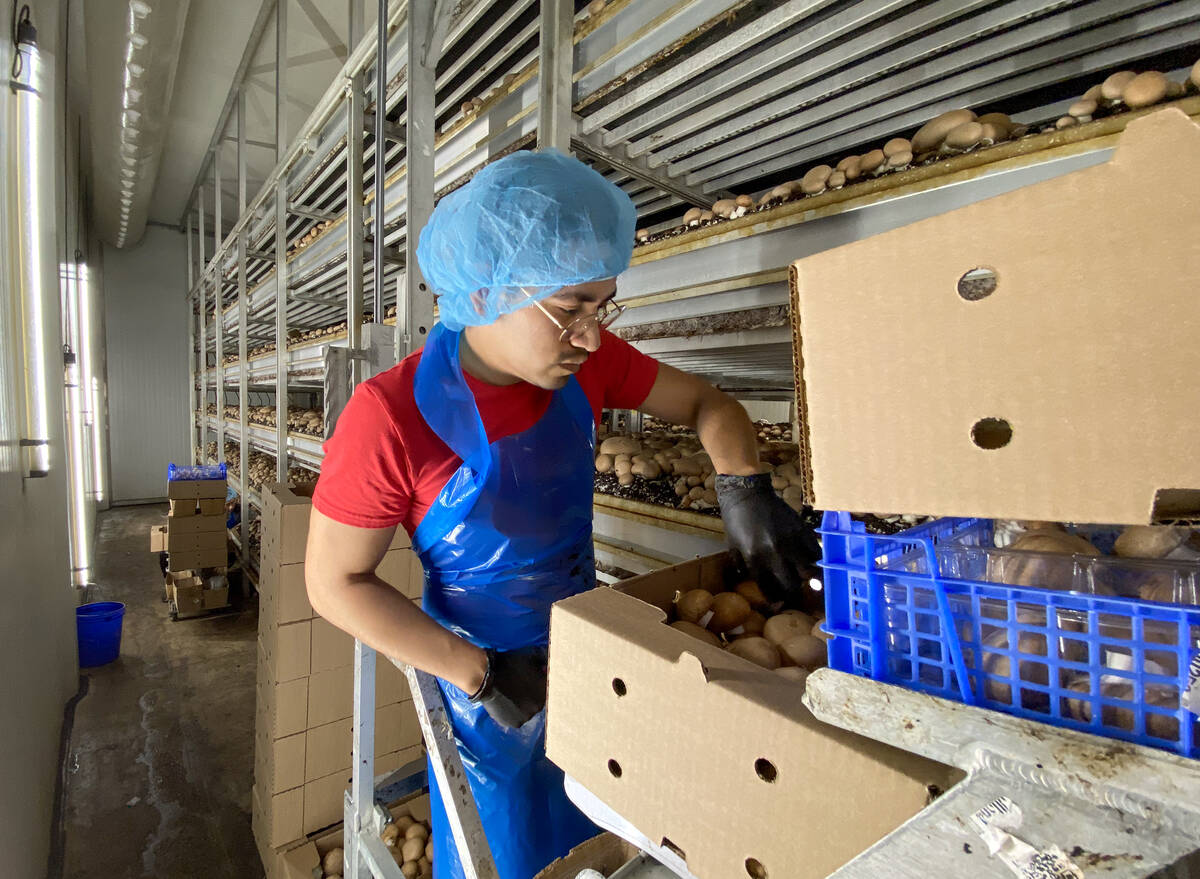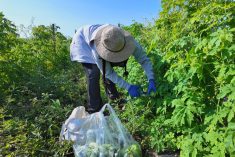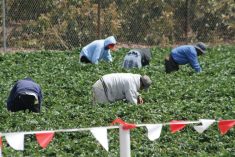Dec. 15.
To some, it may mark 10 days until Christmas, for hundreds of stranded Trinidad and Tobago workers, it’s doomsday, of sorts.
The razor-thin edge between the end of their work permits, which expire on that date – along with their employment insurance (EI) and health benefits and legal residency – is cutting deeper with no information forthcoming about extensions or repatriation flights home.
Why it matters: Temporary foreign workers play an important role in harvesting and planting Ontario crops.
Read Also

Ontario’s other economic engine: agriculture and food
Ontario Federation of Agriculture president, Drew Spoelstra, says Ontario’s agriculture and agri-food sector should be recognized for its stability and economic driving force.
“The hardest part is not what we heard, it’s what we’re not hearing,” said Marlon Gay. “The silence is the worst part of this whole thing, we’re just not hearing anything.”

Gay, who works at E Z Grow Farms in Langton, Ont. made it home from Ontario last year just in time for the birth of his daughter, but he’s missed every milestone since.
“I missed her first birthday, I missed her first steps, her first words – I missed everything,” said Gay. “There is not a day that passes that I don’t speak to her because my greatest fear is her forgetting me and not knowing who I am when I reach home.”
The uncertainty for their staff hits hard for Dusty Zamecnik and his parents, the owners of E Z Grow.
“I feel for these guys and our whole family does because they’re away from their families and we know it,” said Zamecnik. “They aren’t just essential workers, they’re family.”
He said the workers are the sole breadwinners for their families and spend eight months of the year in Ontario working hard so they can go home for “a sacred four months to enjoy the fruits of their labour . . . and now to add this on top of it?”
This month Zamecnik received exemption papers for one of his nine workers to fly home on Dec. 12, so did neighbouring Norfolk farmer Brett Schuyler.
One of Schuylers’ 111 workers is pregnant, said Zamecnik, and when he and the worker who received the exemption asked the government if it could be switched over to her. The request was denied.
“We have no rhyme or reason as to how this selection process (works),” Zamecnik said. “Where are they pulling names from? What is the pool that they’re saying, ‘Yup, it’s you’?”
Zamecnik said at this point he’s not optimistic his workers will get visa extensions or an exemption to fly home before the work permits expire, or anytime soon there after.
Accepting defeat?
On Dec. 6 the Trinidad consulate asked for a list of workers who are still in Canada, a list Zamecnik had already provided four times. In addition, they asked for a list of workers who would be willing to stay until the 2021 season, he said, adding there are no non-charter commercial flights on the docket to Trinidad or Tobago until late January.
“They’re really borderline accepting defeat and stating, “Well, which of your guys are willing to stay until next year?’” Zamecnik said. “It’s bizarre.”
Not only are producers fighting for an extension for the workers, they’re being told by Ontario, Canada and Trinidad they are financially responsible for the worker’s essentials, including accommodations.
“None of that (support) is there, nothing,” he said. “And we’re a day away from them being refugees.”
Additionally Zamecnik said there are concerns if the visas expire they’ll have to go through the whole process of renewal which might be far more challenging this year.
Senator Rob Black, a long-time advocate for agriculture, said even before the work permits expired some of the stranded workers are having issues accessing Employment Insurance benefits they’ve paid into.
Instead, employers like Zamecnik are providing cash advances out of pocket or the workers are struggling.
Black and two of his colleagues, Frances Lankin and Ratna Omidvar, sent a letter to the Prime Minister, the Deputy Prime Minister, the Minister of Agriculture and Agri-Food and the Minister of Immigration Refugees and Citizenship Dec. 10 requesting they address the issue and get it moving forward.
“There’s a defined time (line) . . . and these folks, what few rights or privileges they have now, will be less,” he said. “With respect to the group of workers from Trinidad and Tobago, I think there’s some easy fixes and it’s time we got on them.”
Easy fixes possible
Specifically, the letter asked the respective ministries to “work with affected workers to access health care and employment benefits, support them in applying for new work permits should they wish to seek new employment and assist employers in preparing housing.”
Black said many of the bunkhouses, trailers and outbuildings used to house workers were not meant for winter living, which will require producers to provide costly alternatives.
“Part of it is making sure…that these folks aren’t cast out,” said Black. “But part of it has to do with working with the country of Trinidad and Tobago and finding out just what the problem is that they can’t come back.”
The Zamecnik are erring on the side of caution and have provided heavy winter boots, coats and clothes for their workers to negotiate the frigid winter temperatures. Fortunately, their bunkhouses are winterized.
The guys have cranked the heat to 27 degrees, said Zamecnik with a laugh, adding they’re blowing the electrical budget.
In spite of his humour, you can hear the strain in his voice – the emotional drain of the situation on the employers and employees is almost equal to the financial one.
Neil Phillip, a 10-year veteran at E Z Grow said compared to the United States, the number of Trinidad and Tobago workers in Canada is small, and that may have contributed to them being put at the back of the line.
“It’s not just 800 people here, you’re looking at 800 families, if it’s an average of 3 people per family you’re looking at 2,400 people,” Phillip said. “These are people who are willing to help themselves.”
Zamecnik said he’s reached out to local representatives within each level of government, the Trinidad and Tobago liaison and Minister of National Security in hopes of gaining some insight on how to expedite the process.
If the workers get the necessary permissions to fly home they will need a clean COVID-19 test within 72 hours of their flight. Once back in Trinidad they will be required to self-isolate for a minimum of seven days. The state has funded quarantine programs but, from what little they’ve heard, those are full. Phillip said, they’re willing to pay for their quarantine but they can’t even get answers if that is an option.
Looking for answers
“They’re not giving us any answers, as far as I know, we don’t even have our liaison right now,” said Gay. “Word is going around that he’s being replaced and isn’t even in the country at the moment. That could be just rumour but we don’t know because no one is reaching out to us.”
Gay said he and his wife have discussed the possibility there won’t be a flight available, or it will come too late to facilitate the seven-day quarantine in Trinidad as well as the 14-day quarantine needed upon his return to Ontario for the new growing season.
“It’s not what we want but no one knows what is going on,” said Gay. “So we’re just trying to think about any possible scenario and how best to overcome it beforehand if it has to become our reality.”
Flipping through images and video of his wife and six-year-old daughter on his phone, Phillip said the last five months may have been the most difficult he’s ever encountered.
“Two days ago my daughter said ‘Daddy when are you coming home?’” he said. “Soon baby soon, that’s all I can say is soon.”













